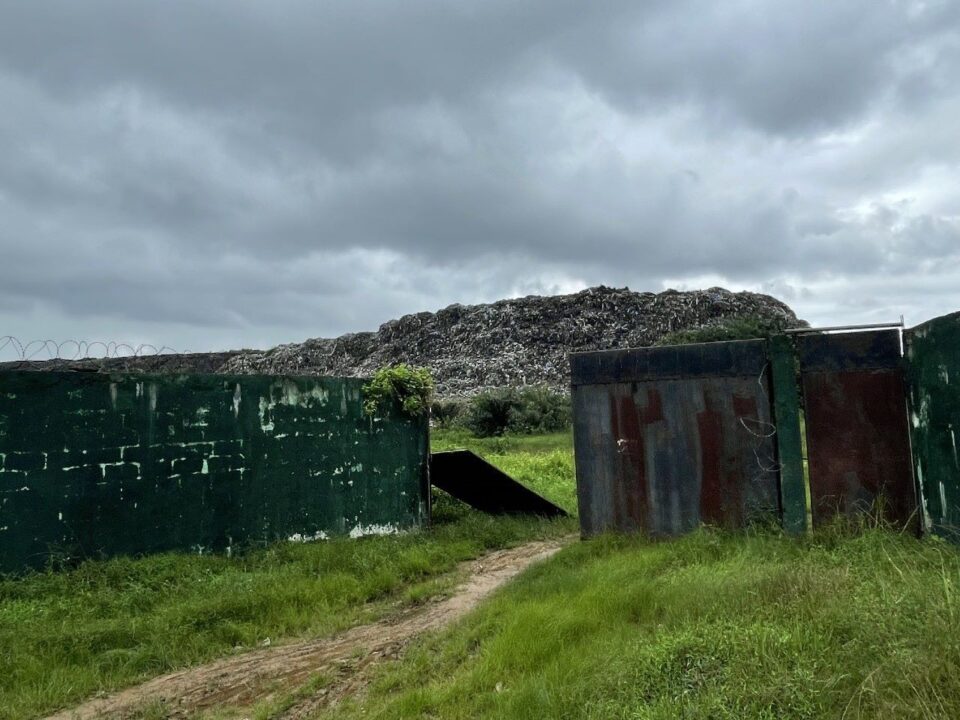By Aria Deemie /Internews Environmental Reporting Fellow
MONROVIA — In Whein Town, a community overshadowed by a massive landfill, residents face daily health challenges from contaminated water and poor waste management. Despite their resilience, the lack of safe drinking water intensifies their plight, showing a desperate need for intervention.
“I moved here in 2008. This place was a beautiful mountain-like red dirt hill, with running water; people used to come here to do video recordings for music and movies,” she recalls.
Living with Contaminated Water
Dedee Forkpa, a 36-year-old mother of five, endures daily struggles living near the W(h)ein Town landfill, located at the outskirts of Monrovia City in Montserrado County, approximately 13 km northeast of Monrovia.
“I moved here in 2008. This place was a beautiful mountain-like red dirt hill, with running water; people used to come here to do video recordings for music and movies,” she recalls.
“At the end of 2008, we heard that they were bringing a dumpsite here, and people had their land and houses all in this fence. I had my land there too. World Bank bought it from us and started bringing big pipes and trampolines”.
Dedee initially thought the dumpsite wouldn’t be a problem.
“When they first started, they were under a certain company that used to cover the garbage with red dirt every six months; it was okay. But since the government took over, the place is poorly managed. The scent of this dirt can give you throat cancer, and the mosquitoes from this dirt are like flies. Flies, rats, and snakes are everywhere. We’re living on Flagyl, Doxycycline, malaria, and typhoid medicine. Right now, I’m not well—typhoid is killing me,” Dedee cries out.
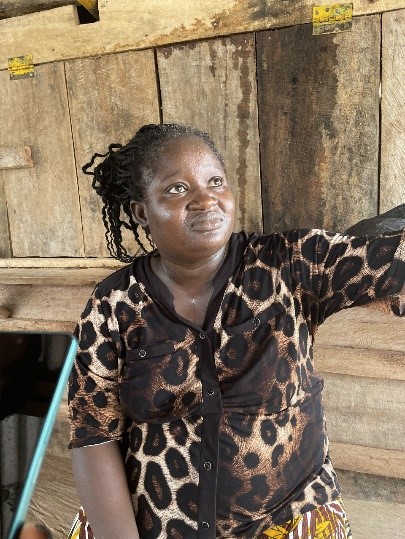
Dedee Forkpa discusses the challenges she faces as a result of the landfill with reporter Aria Deemie at the Telecom-Whein Town Community on July 31
Whein Town a managed landfill site facility owned by the Monrovia City Corporation operations were previously contracted to an independent contractor and the international engendering consultancy Poyry GMBH who acted as the design and supervising engineer on behalf of MCC.
The landfill’s, operations and maintenance guidelines and the environmental management plan for the Whein town sanitary landfill facility stipulate that “All waste is to be covered with a layer of earth at the end of the working day, and no waste should be left uncovered for a period greater than 24 hours to minimize infestations of flies and rats”. The guidelines also caution that the procured 10-hectare site offers only short-term airspace until a permanent or long-term landfill is developed.
Sayzay Kezele, Bengee Community Health Centers, a clinic approximately 4mins walk from the landfill, supervisor, shares his experience as a health worker in the community
“People often treat themselves at home mostly for cases like diarrhea, when it gets worse, they come here. Many are afraid to seek treatment early because they lack money,” he says.
“Children are the most affected. Recently, we treated a 2-month-old with severe malaria. We try to educate the community to reduce these diseases, but poor sanitation and lack of support make it difficult”.
Further stating that “We receive around 250 patients monthly, and about 125 test positives for malaria and typhoid,”.
Liberia’s National WASH Commission plan (PAPD 2018-2023) indicates that access to safely managed drinking water supply under SDG definitions remains below 4% at the national level, with the rural population under 1% served.
2020 estimates from the WHO/UNICEF Joint Monitoring Program, 75 percent of Liberians had access to a basic level of drinking water, including 85 percent of urban residents and 64 percent of rural residents. However, only 18 percent of the total population had access to basic sanitation services.
Environmental Health expert Nick Benito Goll warns “We’re poisoning our future generation. It’s not only Wein Town; the aquifers are connected everywhere. The impact is moving; we just feel that because Wein Town is in close proximity to the landfill, they alone are affected. They’re close to the potential impact, but the W(h)ein Town landfill could be polluting not just the groundwater but even the water body”.
Water and Sanitation Woes
These dire conditions affect community dwellers like Dedee and 22-year-old Wisdom W. Wayne, another W(h)ein Town resident in this community of about 10,000 people.
“After they put stop to our water source (the spring) My dad voluntarily gave them a piece of land to build a water tank, which they constructed. We had to pay ten Liberian dollars (10LD) per gallon to the leadership for maintenance. But since the reservoir spoiled in 2020, they haven’t repaired it”.
“All the water we drink here is tasteless,” Wisdom adds. “Before then, we used to have good, safe drinking water. Now it’s not safe to dig wells around here”.
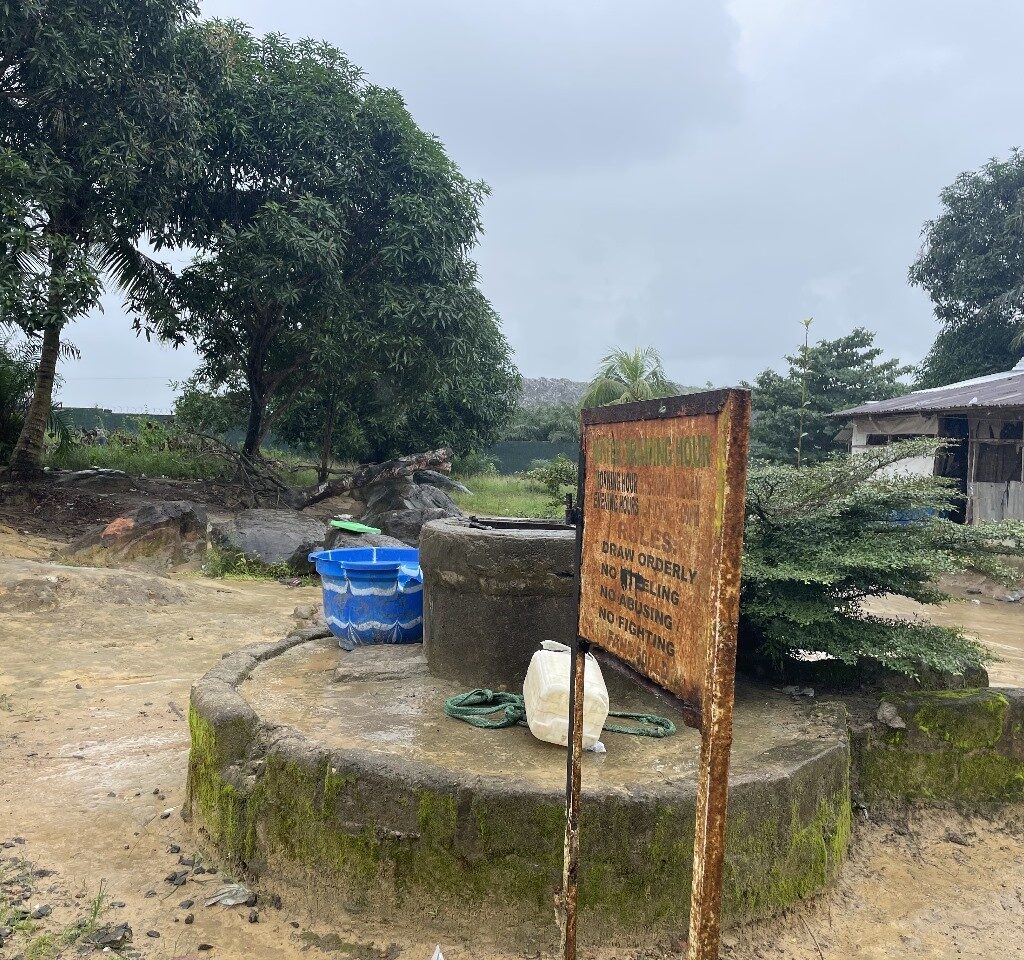
An image of a well a stone throws away from the back of the landfill
“When rain falls, it flows from highlands to lowlands, infiltrating our groundwater. If the water is polluted, those using wells will also draw up contaminated water. The Wein Town landfill is an open dumpsite, not covered cell by cell as it should be, allowing organic wastes and other contaminants to seep into streams, rivers, and our groundwater. It’s a serious issue, and people are using this water for bathing and cooking”. Says Environmental Expert Mr. Goll.
MCC’s operations and maintenance guidelines and environmental management plan note that the development of the landfill facility could impact the water quality of receiving surface and groundwater bodies. Superficial surveys/inspections indicated that a spring in the hillside area, previously used by the local population as a water source, was damaged during the establishment of the landfill. A water supply well was installed to replace the damaged spring.
Public Health Expert Mariatu Yekee warns against untreated waters
“Children are mostly at risk; they don’t have the same immune system as adults. With the proximity of the landfill, untreated waters could result to diarrheas, vomiting and even severe sicknesses wherein they could be dehydrated and hospitalized.
Public Health Crisis
“I live at the back of the garbage fence; the back has been broken down for months, and they haven’t fixed it. All the waste products float outside during heavy floods and rainy seasons, affecting our water. Sometimes our stomachs can run, and we toilet with blood for like a week, sometimes two days, three days from this very water we’re drinking,” says 27-year-old Archie N. Weanquoi Sr.
“They told us they were going to bring water for us. The tank is here; they’ve built the tank and everything. But there’s no water. I have a 3-year-old child, and I am not working right now to afford buying mineral water. When my daughter gets sick, I struggle to take her to the hospital,” Archie continues.
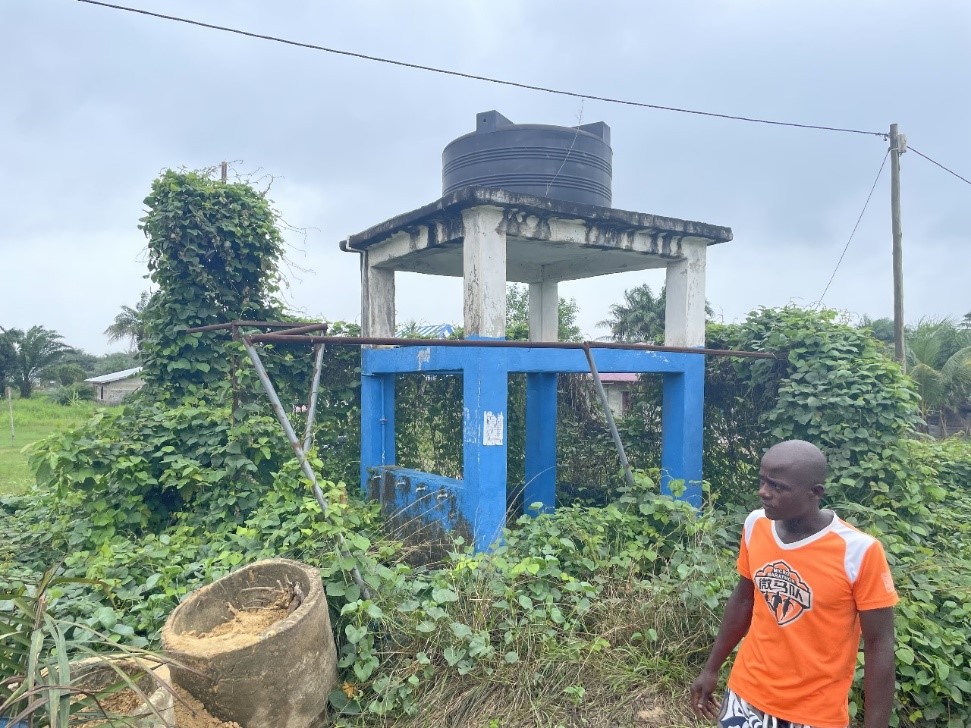
A picture of Archie showing reporter to the reservoir lying in ruins
Laura M. Wilson, a mother of six children (ranging from 1 month to 16 years old) and a classroom teacher at an elementary school, echoes Archie’s concerns.
“When it rains, all the feces, pampers, and snakes leave the fence and come out in floods to us. My children have to stay home from school. The wells and pumps are all polluted. We’ve been to many ministries to complain, and they told us that this waste was going to be transferred, but to our utmost surprise, this place is still here. We can’t fight the government; we are only praying that they listen to us,” she says.
The Leadership’s Perspective
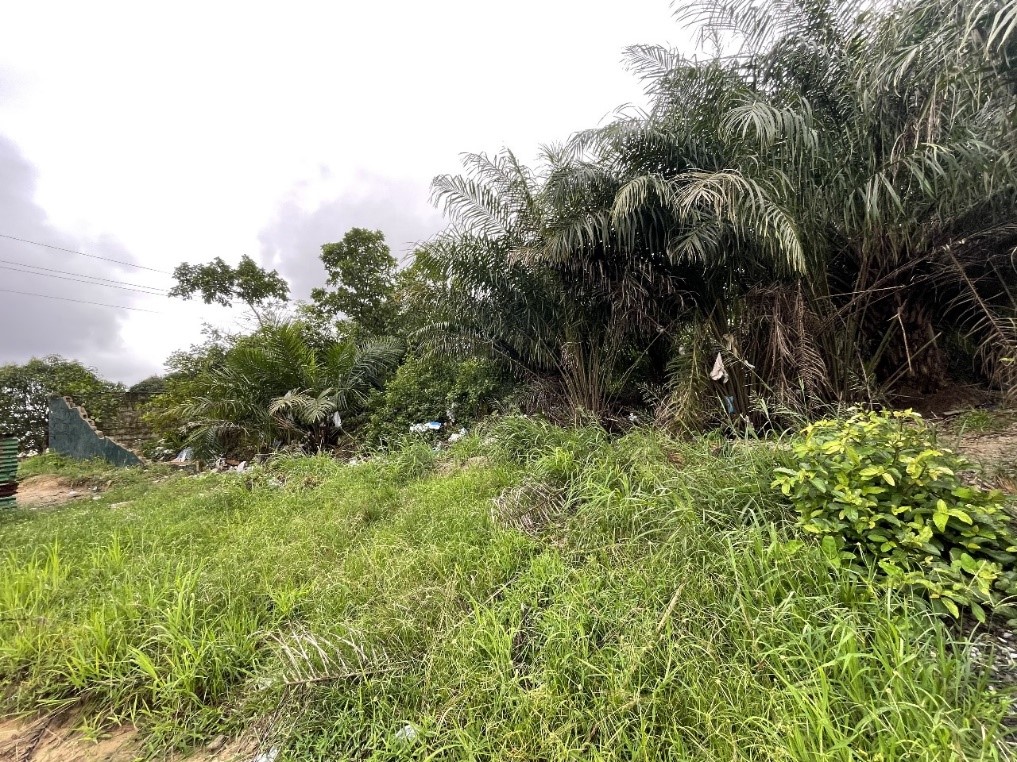
The back of the landfill’s fence that has broken down
Samuel Kofi Jones, Secretary General of the W(h)ein Town Community, has witnessed the ongoing struggles firsthand. “From 2010, we’ve faced air pollution and sanitation issues and have engaged the Government, but we’ve seen minimum efforts,” he says.
“The government has made some efforts, such as constructing a concrete fence, that is now partially down and five reservoirs. However, when the pipes meant to supply drinking water were damaged during road construction, the site management here said the issue was with Water and Sewer. They promised to rehabilitate the pipes, but it hasn’t happened.”
“Given the ongoing problems with Water and Sewer, our community decided not to wait any longer for safe drinking water. Three months ago, we recommended drilling a borehole on the hill at the front of the community to supply us with water while we wait for the repair of the Water and Sewer pipes. Until now, we’re still waiting.”
“As a community, we want the dumpsite relocated. The landfill’s lifespan was supposed to be 10 years, but it’s been 14 years now. Our population here has increased, making this more hazardous,” Samuel says.
Mo Ali, the Managing Director of Liberia Water and Sewer, claims he is unaware of the community’s plight.
“I am not aware of a reservoir in W(h)ein Town. We do have plans to reach water supply to unserved communities,” he says. “I have not received any complaints from the community about these issues. I will investigate,” he adds.
In 2017, the Liberian government, with grants from the World Bank, launched the Cheesemanburg Landfill and Urban Sanitation (CLUS) project to be concluded in June 2020, but was later requested to be closed in June 2023. This initiative aimed to improve solid waste collection and disposal at the new Cheesemanburg landfill and close the existing Whein Town landfill to reduce environmental and health risks.
Despite this reporter’s persistent efforts to obtain responses from both the Monrovia City Corporation (MCC) and the Paynesville City Corporation (PCC) amd the Safe Guard officer at the landfill regarding sanitation efforts in the community and the relocation of the Whein Town dumpsite, neither party has been forthcoming. After multiple failed attempts to schedule interviews, both MCC and PCC requested that they be sent questions in advance.
However, despite fulfilling this request, they ultimately did not proceed with the interviews.
This reported has done all she could to ensure their perspectives are included, and will continue to seek their input for future updates on this ongoing issue.
Awareness and innovative solutions could help
“While we’re already focusing on preventing cases of Mpox, we shouldn’t neglect health hazards that would sprout other outbreaks like chloride,” warns Public Health expert Mariatu Yekee.
“We need the collaboration of Ministry of Public works NPHIL, EPA, MCC, PCC, Liberia Water and Sewer and the community in order to create awareness and find remedy in order to prevent the potential outbreak of sicknesses,” Yekee says.
Environmental expert stresses the need for more awareness and outlines the effectiveness of various kinds of technologies: Benito:
“There is a need for environmental awareness and education, to save the future generation. Our country has to have a win-win solution to waste management. There are several technologies that follow the 3R, reduce, reuse, recycle, to turn the problem of waste management into an opportunity for employment. If not, we’ll be digging big holes all around here and polluting the environment, our water body and hydraulic cycle. We need an integrated system, where it’s not just landfill. “Where we can use plastic for fuel, titles, tires, chairs, bricks. Remold and refurbish phones. Organic wastes for fertilizers. Where we can leave just sweeping the streets and going to dump it to a big dumpsite.”
Despite some efforts from the government and community leadership, much remains to be done to alleviate their suffering and provide them with safe, clean water.
“The relocation of the dumpsite and restoration of safe water supply must be prioritized to protect the health and well-being of the community,” Dedee says

